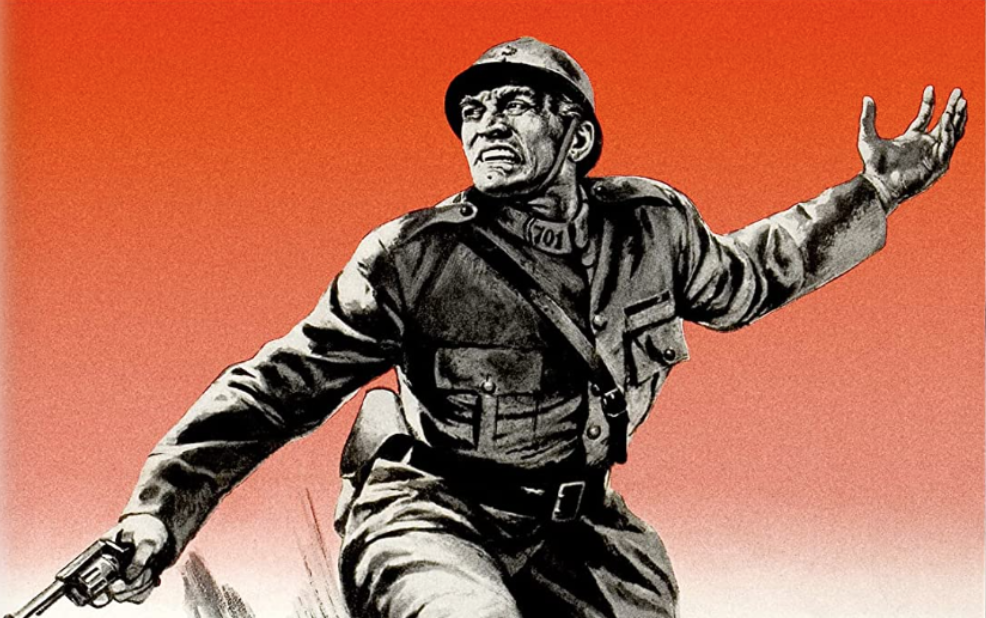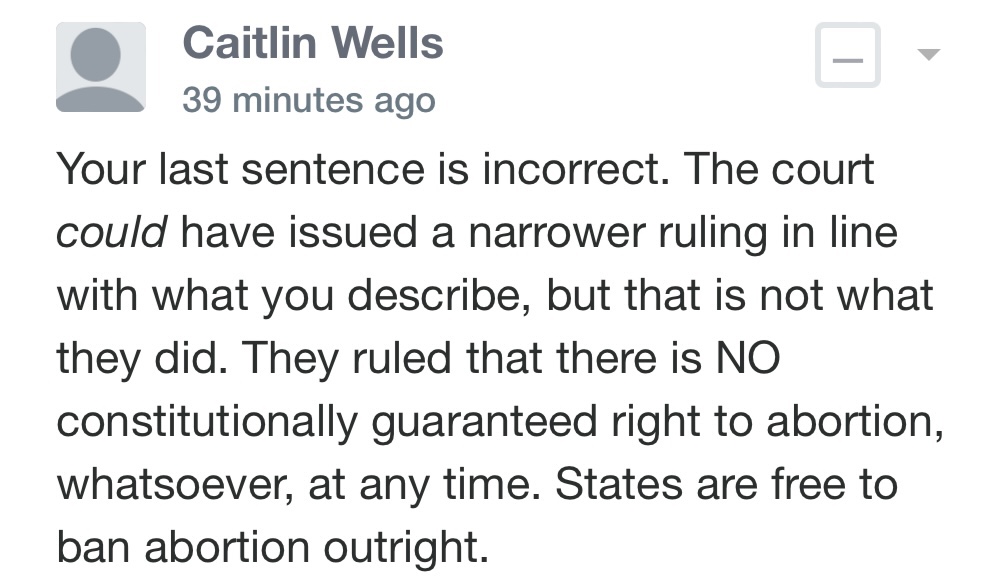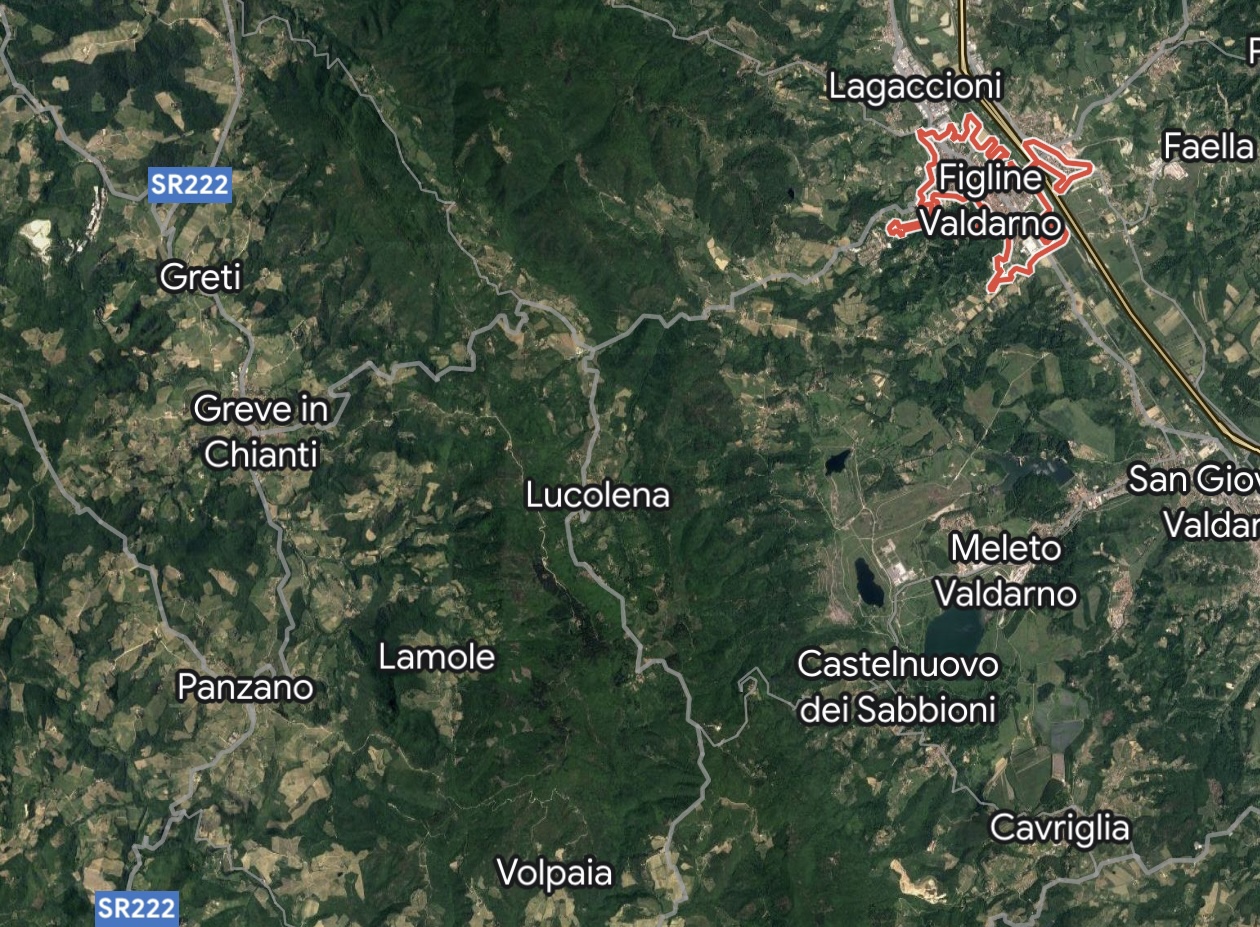These clips have been viewable on YouTube for years and years, but it’s so soothing and nourishing to just sit back and listen to the best of them…41 minutes of Marlon Brando recollections, one after another, etc. The video quality is mostly awful, and they’re not even the best I’ve seen or heard, and the guy who threw them together repeats a Karl Malden clip. But it’s still something. Especially the observations of Francis Coppola (starting around 17:00). My favorite is Chris Reeve‘s candid admission to David Letterman [31:55] that he “doesn’t worship at the altar of Marlon Brando [because] he doesn’t care anymore.”
Daily
“You Shouldn’t Talk That Way To Me”
I never even saw the dystopian A Boy And His Dog (’75), the only film ever directed by the late L.Q. Jones. All my life I’ve associated Jones with his Wild Bunch character (“Y.C.”), a bounty hunter described by Robert Ryan‘s character as “egg-suckin’, chicken-stealin’ gutter trash.” Jones was an honored member of Sam Peckinpah‘s stock company (Ride the High Country, Major Dundee, The Wild Bunch, The Ballad of Cable Hogue, Pat Garrett and Billy the Kid). Jones began working as a character actor in the mid ’50s, and he kept at it until the mid aughts. He passed earlier today at age 94 — respect and condolences.
Either You’re The Kind of Person
…with the ability willingness to not just tolerate but half-enjoy Thor: Love and Thunder, or you’re not. I was all set to hate-watch it last night, but I couldn’t do it….I couldn’t pull the trigger. That projected $135M to $145M weekend tally matters not. It mustn’t matter.
Trenches and Chateaus
The Criterion Bluray of Paths of Glory looks absolutely perfect. I’ve seen a clean, grade-A print of this 1957 film projected in a first-rate screening room under optimum conditions, and the Criterion exceeds even that standard. It’s fine that Kino is releasing a 4K Bluray on 8.23, but how much better can it look? I’m trying to imagine this as we speak.
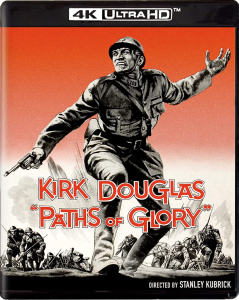
Very Sorry About Paulie
Tony Sirico‘s career peaked with his delicious Paulie Walnuts character in The Sopranos. Paulie’s feet were always firmly planted and he always came from a real place (there was no trouble believing that he could be malicious and predatory), but a good portion of the time he was funny.
Especially during the two calico cat scenes inside Satriale’s upstairs meeting room. And the entire brilliant Pine Barrens episode. And the scene when James Gandolfini‘s Tony discovered that Paulie had restored the painting of himself (dressed as an 18th Century general) and Pie-Oh-My, and hung it in his living room.
Sirico was a solid, reliable New York character actor (I enjoyed his banter in James Toback‘s The Big Bang) and a good guy off-screen, but Paulie made him a legend and vice versa.
Sirico has died at age 79.
Wiki excerpt regarding The Big Bang:
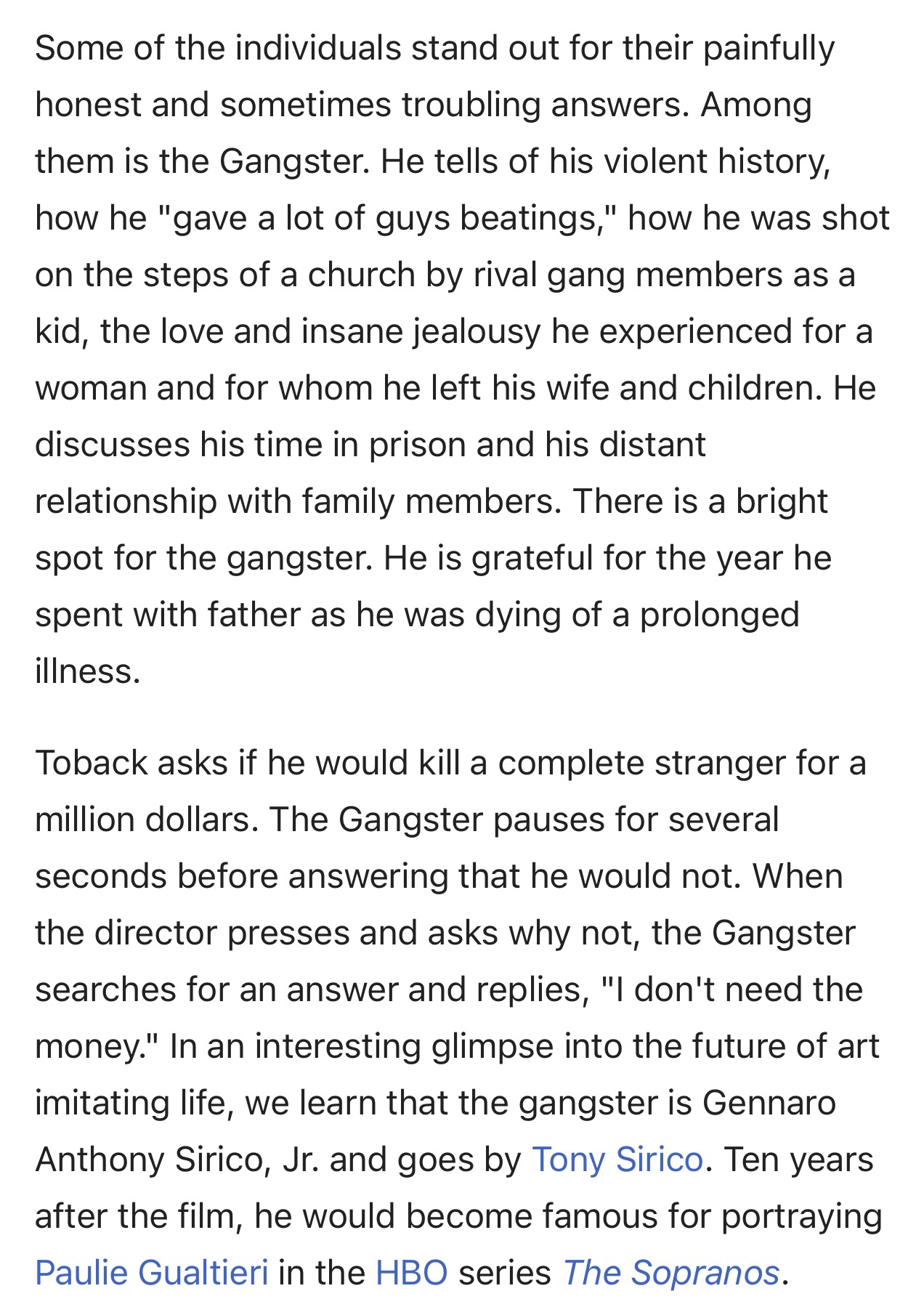
Too-Early Best Picture Predictions
Eight days ago Award Watch‘s Erik Anderson posted a spitball list of 20 Best Picture nominees, listed in order of hunches or likelihood. Boldfaced HE indicates strong agreement on my part; non-boldfaced WHUT indicates uncertainty, skepticism, halfhearted agreement and/or no comment; no reaction at all means no fucking reaction at all.
I will post my own roster of preferential likelies sometime tomorrow morning. Right now I’m figuring the four hottest contenders are Killers of the Flower Moon, Bardo, Babylon and Avatar: The Way of Water. Please respond in some way, shape or form to the current whatever-this-is.
1. The Fabelmans (Universal Pictures) / HE
2. Killers of the Flower Moon (Apple Original Films) / HE
3. Babylon (Paramount Pictures) / HE
4. Bardo, A False Chronicle of a Handful of Truths (Netflix) / HE
5. Everything Everywhere All at Once (A24) / WHUT
6. Avatar: The Way of Water (20th Century Studios) / HE
7. Women Talking (MGM/UAR) / WHUT
8. The Son (Sony Pictures Classics) / HE
9. The Whale (A24) / WHUT
10. Empire of Light (Searchlight Pictures) / WHUT
11. TÁR (Focus Features) / HE
12. Thirteen Lives (Amazon Studios/MGM/UAR)
13. Broker (NEON)
14. The Banshees of Inisherin (Searchlight Pictures)
15. Elvis (Warner Bros)
16. She Said (Universal Pictures) / HE
17. White Noise (Netflix) / HE
18. Napoleon (Apple Original Films) / HE
19. Triangle of Sadness (NEON)
20. Shirley (Netflix)
Abortion Limits in Liberal Europe
The European community is very liberal about abortion laws. 95% of European women of breeding age “live in countries which allow abortion on demand” (the exceptions being Malta, Vatican City, Liechtenstein, Andorra, and Poland). But — but! — the vast majority of European nations aren’t supportive of abortions beyond the first trimester, or roughly 12 to 14 weeks. The only nations that allow abortions beyond 14 weeks are England/Scotland/Wales and the Netherlands, or so I’m gathering.
The legal dispute that led to the overturning of Roe v. Wade, which held that women have a constitutional right to abort their fetuses up until viability (or the 23rd or 24th week), was called Dobbs v. Jackson Women’s Health Organization. It was/is a Mississippi law that prohibits nearly all abortions after 15 weeks of pregnancy. The recent Supreme Court abortion ruling stated that a women’s right to choose an abortion up until viability was not constitutionally guaranteed, but in holding with Mississippi seemed to state that 15 weeks, not 23 or 24 weeks, was the cutoff, which fell in line with most liberal European nations.
Caitlin Wells disputes:
What Motivated Shinzo Abe’s Murderer?
Would it kill Japanese journalists to indulge in a little thoughtful speculation about the possible motive of Shinzo Abe’s assassin?
All I’ve read so far is that the shooter is in his early 40s, and that “local Japanese police said the handmade gun used in the shooting was more than a foot long and eight inches in height. They also said they seized several handmade guns in a search of the suspect’s home.” The handmade gun angle alone suggests a deranged killer, I realize, but is that all?


Poison In The Soup
Critical Drinker to actor-podcaster Clifton Duncan (6.26.22): “The original Star Trek series, from back in the ’60s…a lot of the writers had served in the military in WWII or Vietnam…giving them all kinds of experience…how chain of command works and how [soldiers] relate to each other in high-pressure situations, and also [they were different] in terms of general maturity about life. But when you look at it now, the people who are writin’ it, the worst hardship they ever had is that someone got their Starbucks order wrong or someone misgendered them on Twitter. That’s not comparable…they don’t have that same well of experience to draw on, and it shows.”
I’m not familiar with Duncan’s acting history (The Good Fight, Scrooge: A Christmas Carol with a Twist, Bluff City Law, NCIS: New Orleans) but he’s a smart, smooth-spoken interviewer, and his discussion with the Scottish CD (aka Will Jordan) definitely gets into the myopic, identity-driven, woke-terrorized nature of screenwriting these days…the climate is too nice, too safe, too sanitized.
YouTube commenter Konstantin Dahlin: “The people in the industry only virtue signal to the people around them. The people they fear. They do not dare step out of line because that can mean losing their jobs. This is a self-sustained ideology where you can have a room with 10 people and none of them is woke, and yet everyone will behave and talk as if they’re woke because they are afraid that some of them, or all, might be. Its a radical ideology that is self-sustained and based on fear. No one except authoritarian types and people with head issues [are cool with] this. Most people are normal, and normal people don’t like radical wokeness.”
“What’s Wrong With It?…It’s Cottage Cheese”
The diner scene in Thief is one of James Caan‘s best acting moments ever (obviously), but also the most emotionally wide open and vulnerable in a given screen moment. And the scene doesn’t work, of course, without Tuesday Weld‘s defensiveness, defiance and hostility gradually downshifting into moderation and then listening, and then opening up herself. And finally accepting what’s being offered.
Hat tip and condolences to director-writer Michael Mann.
Sidenote: Any sensible woman would realize, of course, that a professional diamond thief whose survival motto is “nothin’ means ‘nothin'” is not a good bet for a domestic relationship with an adopted kid. Sooner or later the shit will come down and he’ll get out the lead pipe and clobber the aggressor and then the nihilism will kick in. Almost everyone who watches Thief can see this, but the film is so mesmerizing and so well acted that they let it go.
Sting Losing The Battle
Sting is the big star, loose and cool and playing at a private party in Figline Valdarno, a leafy Tuscan hamlet about 25 km south of Firenze. And having a good old time with “An Englishman in New York,” a 1987 tune that everyone knows and loves. So he has the ears and hearts of the crowd, but alas, not their visual attention. Sting may not be aware of what’s going on, but the woman behind him, trust me, is revelling in the moment. [Performance recorded sometime in the summer of ’20.]
This is my part of Tuscany — Greve, Panzano, Volpaia, San Donato. I’ve driven and scootered all over this region.
Good “Gambler” Advice
Karel Reisz, James Toback and James Caan‘s The Gambler (’74) is at least ten or fifteen times better than Rupert Wyatt and William Monahan‘s 2014 remake. But at least the latter allowed costar John Goodman to deliver a magnificent riff about “fuck you” stability.

